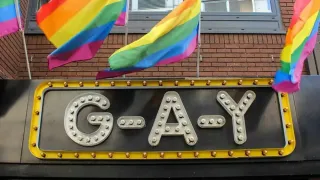April 19, 2015
Trans People Face High Costs to Transition
Kilian Melloy READ TIME: 7 MIN.
Jaclyn Mae came out of the closet when she was 21. When she told her family in Indiana that she was a transgender woman, she quickly realized they were not receptive to the idea and decided she had to get out of what she called an "abusive environment" at her mother's home.
A year after telling her family, she moved to New York and then followed her girlfriend, who is also a trans woman, to the Bay Area less than a year ago.
"I haven't looked back," she said. "I'm not going to let them in my life again."
Now 26, the San Jose resident has turned to the Internet and the goodwill of strangers in hopes of funding her decision to go through with gender reassignment surgery. Although the state's Medi-Cal insurance will cover most of the costs of major surgery, she is seeking $8,000 for ancillary procedures to make her transition complete.
But even with growing government support, far from everything is covered.
"Help save a transgirl's life!" reads Mae's online crowdfunding page, which has raised $300 so far (http://www.gofundme.com/cf7rxg).
Mae's appeal is just one of dozens of online pleas for money to help support trans men and women with the medical and other costs of their transition so they can physically present themselves, not as the gender they were born into, but as the gender with which they identify. For Mae and others who decide to undergo surgery as part of their transition, this is less a cosmetic change than a life-saving procedure. Despite insurance, total costs quickly reach into many thousands of dollars.
Gender reassignment surgery can reach into six figures without insurance coverage. For women becoming transmen, the basic procedures include surgical removal of the vagina (vaginectomy) and construction of a penis (phalloplasty), which can total $100,000. For men becoming transwomen, there is surgery to remove testicles (orchiectomy) and create female genitals (labiaplasty), which may total $75,000.
Although such basic surgeries are increasingly covered by insurance, that doesn't include other procedures for transwomen like breast augmentation, tracheal shaves to smooth the Adam's apple, or lengthy and painful electrolysis to remove hair in unwanted places. Transmen often also choose top surgery to transform breasts into a chest. These out-of-pocket costs can run an additional $10,000 to $40,000. Advocates for the trans community are lobbying for some of these things to be covered as well.
"I'm pretty much doing everything I can or raising the money I need," said Mae, adding, "I don't like taking money from others."
Changes in health care law have helped assuage the mounting costs of transitioning for both transmen and transwomen. Through the Affordable Care Act, many people have become eligible for coverage and can no longer be excluded for transgender care.
That sounds like a boon for the transgender community. But the benefits may still be more theoretical than practical, said Dr. Dawn Harbatkin, the medical director of San Francisco's Lyon-Martin Health Services, which sees trans patients.
"The reality of it is there just isn't sufficient medical capacity to accommodate the number of people who want care," she said.
San Francisco's Health Plan, the local program for Medi-Cal recipients, is lauded as one of the most progressive health coverage programs. But to qualify, patients have to meet stringent financial criteria, such as living as a single city resident at or below the poverty line. At that point, proceeding with a major surgery, such as gender reassignment, is more difficult to organize.
For some, the magnitude of costs means making some hard financial choices. Home builder Erin P., of Davis, California, decided to buy a house first, which required putting some of her surgeries on hold.
"I could have gotten facial feminization surgery and that would have been nice," said Erin, 28, who asked that her last name not be published for privacy reasons.
"I do have bad days where people 'sir' me in the market, and that's no fun," she added.
Erin came out to her family in 2011, and later on the job "because it reached a point where I could no longer keep up a charade."
She is calculating the costs of additional surgeries not covered by her Kaiser insurance and is keeping tabs on other costs in her transition. She called the expensive electrolysis hair removal "its own private nightmare." She already has invested about $600 for laser hair removal on her face, but the more effective electrolysis costs about $70 an hour and totals thousands of dollars. Facial hair removal can take up to 30 hours, and genital hair removal takes an additional 20 hours. Years of weekly appointments may be required.
The costs don't end at the surgeon's office. In Arizona, where Erin's reassignment surgery is scheduled, she'll foot the bill for a hotel stay during the six weeks of recommended recovery time. Incidental expenses, from a new wardrobe and pricier hair care, to cosmetics and epilation, are other costs she didn't initially tally. But there are trade-offs: she no longer has to wear a suit, which she calls, "the grossest thing."
Document Costs
Transforming appearance is just part of transitioning. It also involves selecting a new name and changing one's gender identity on a host of legal documents.
Before July 2014, Erin was one of many transgender community members who spent hundreds of dollars on name and gender change costs. Name change petitioners had to put an announcement in a newspaper for $100. A court order and appearance followed for $425. For various agencies, such as the Department of Motor Vehicles or Social Security Administration, there were countless forms, which totaled about $100 in change fees.
Then California law changed with the passage of Assembly Bill 1121, which removed court requirements and fees and public notification in a newspaper in an effort to make identity changes easier and cheaper for the transgender community.
"California has one of the most progressive policies in the country," said Anand Kalra, program manager at the Oakland-based Transgender Law Center. Other states are more restrictive and costly, but it varies based on county filing fees, he said. Many states continue to require a publication notice and some states even require reassignment surgery before a gender change on documents, he said.
Erin has yet to tackle her birth certificate and passport, but she is proud of the changes to her driver's license, Social Security card, college diploma, and professional engineering certification.
Delicate Issues
There's also the delicate matter of deciding whether to provide for a possible biological legacy. Before surgery, Erin took the extra step of saving her sperm samples. She paid $1,200 for an initial setup and for the past three years has paid a $350 annual storage fee.
"Once those samples are gone, you can never bring them back," she said of her decision to preserve the opportunity to pass on her genes.
For Mae, Erin, and others like them, planning surgery may require traveling long distances to find surgeons and health care providers. Another hurdle is getting the few specialist surgeons in California to contract with insurance plans that accept trans men and women's insurance, Harbatkin from Lyon-Martin said.
"It's not that it's not covered," she said. "It's about finding a surgeon who is contracted with the plan." She said there are about a handful of surgeons who perform phalloplasty, or penis reconstruction, while there are many more options for top surgery.
Most doctors and surgeons in this field follow the guidelines set by the World Professional Association for Transgender Health, a professional association advocating evidenced based care for those in transition. WPATH asks for two letters of recommendation for major genital surgery.
In Marin County, Dr. Curtis Crane, of Brownstein & Crane Surgical Services, said it is "nearly impossible" for a trans person to pay for all necessary surgeries. He said his office is always working to get insurance companies to cooperate, even in states where there is a no exclusion mandate for those identifying as transgender.
"The transgender movement is medical, social, and political," he said. "Finally the community is being recognized as needing medically necessary surgery."
Crane's patients hail from 40 states and 15 countries. Since opening the surgical practice two and a half years ago, Crane said 99.8 percent of his patients are transgender. The practice, with two surgeons and a third arriving this summer, books out about six months to a year.
In Foster City, Dr. Joel Beck specializes in feminization surgeries, such as body contouring, breast augmentation, and facial reconstruction. These procedures are typically not covered by insurance despite advances in transgender law, according to a spokeswoman for Beck's office who asked not to be named. By the time many transgender patients can afford these additional surgeries, many are in their 50s, 60s or older, the staff person said.
Luca S. also has turned to online fundraising (http://www.gofundme.com/surgeryforluca). The 25-year-old San Francisco man, who asked that his last name be withheld to protect his medical privacy, said he has scheduled his top surgery before his 26th birthday in August so he can stay on his parents' insurance.
"It will only be possible if I make the money," Luca said. "If I don't have enough by the surgery date, I will either postpone it or see if I can pay the rest with credit."
Luca's transitioning costs started with $600 for five sessions with a gender therapist. Once he was able to get a letter from his therapist, he could begin testosterone injections, which he started in October. His insurance doesn't cover the $120 10-milliliter vials of the male hormone, which each last him about six months.
Crowdfunding seemed like the best option. "I have no other way of making the money in a timely manner," Luca said. "With the amount of money I make, it would take years and years to save enough." He is still waiting to see if his insurance will foot the bill for top surgery, but historically this procedure hasn't been covered.
As of early April, he had raised just over $1,000 toward his $10,000 goal.






